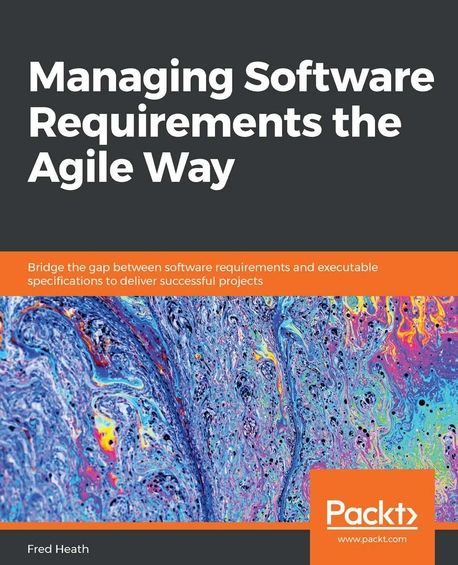Managing Software Requirements the Agile Way
2020년 08월 14일 출간
- eBook 상품 정보
- 파일 정보 PDF (3.92MB)
- ISBN 9781800204997
- 지원기기 교보eBook App, PC e서재, 리더기, 웹뷰어
-
교보eBook App
듣기(TTS) 불가능
TTS 란?텍스트를 음성으로 읽어주는 기술입니다.
- 전자책의 편집 상태에 따라 본문의 흐름과 다르게 텍스트를 읽을 수 있습니다.
- 이미지 형태로 제작된 전자책 (예 : ZIP 파일)은 TTS 기능을 지원하지 않습니다.
PDF 필기가능 (Android, iOS)

쿠폰적용가 15,300원
10% 할인 | 5%P 적립이 상품은 배송되지 않는 디지털 상품이며,
교보eBook앱이나 웹뷰어에서 바로 이용가능합니다.
카드&결제 혜택
- 5만원 이상 구매 시 추가 2,000P
- 3만원 이상 구매 시, 등급별 2~4% 추가 최대 416P
- 리뷰 작성 시, e교환권 추가 최대 200원
작품소개
이 상품이 속한 분야
▶Book Description
Difficulty in accurately capturing and managing requirements is the most common cause of software project failure. Learning how to analyze and model requirements and produce specifications that are connected to working code is the single most fundamental step that you can take toward project success. This book focuses on a delineated and structured methodology that will help you analyze requirements and write comprehensive, verifiable specifications.
You'll start by learning about the different entities in the requirements domain and how to discover them based on customer input. You'll then explore tried-and-tested methods such as impact mapping and behavior-driven development (BDD), along with new techniques such as D3 and feature-first development. This book takes you through the process of modeling customer requirements as impact maps and writing them as executable specifications. You'll also understand how to organize and prioritize project tasks using Agile frameworks, such as Kanban and Scrum, and verify specifications against the delivered code. Finally, you'll see how to start implementing the requirements management methodology in a real-life scenario.
By the end of this book, you'll be able to model and manage requirements to create executable specifications that will help you deliver successful software projects.
▶What You Will Learn
?Kick-start the requirements-gathering and analysis process in your first meeting with the client
?Accurately define system behavior as features
?Model and describe requirement entities using Impact Mapping and BDD
?Create a feature-based product backlog and use it to drive software development
?Write verification code to turn features into executable specifications
?Deliver the right software and respond to change using either Scrum or Kanban
?Choose appropriate software tools to provide transparency and traceability to your clients
▶Key Features
?Learn how to communicate with a project's stakeholders to elicit software requirements
?Deal every phase of the requirement life cycle with pragmatic methods and techniques
?Manage the software development process and deliver verified requirements using Scrum and Kanban
▶Who This Book Is For
This book is for software engineers, business analysts, product managers, project managers, and software project stakeholders looking to learn a variety of techniques and methodologies for collating accurate software requirements. A fundamental understanding of the software development life cycle (SDLC) is needed to get started with this book. Although not necessary, basic knowledge of the Agile philosophy and practices, such as Scrum, along with some programming experience will help you to get the most out of this book.
? Chapter 1: The Requirements Domain
? Chapter 2: Impact Mapping and Behavior-Driven Development
? Chapter 3: Writing Fantastic Features with the Gherkin Language
? Chapter 4: Crafting Features Using Principles and Patterns
? Chapter 5: Discovering and Analyzing Requirements
? Chapter 6: Organizing Requirements
? Chapter 7: Feature-First Development
? Chapter 8: Creating Automated Verification Code
? Chapter 9: The Requirements Life Cycle
? Chapter 10: Use Case: The Camford University Paper Publishing System
▶What this book covers
? Chapter 1, The Requirements Domain, helps you understand the requirements domain and the difference between requirements and specifications, and introduces you to goals and stakeholders, two of the four requirements domain entities.
? Chapter 2, Impact Mapping and Behavior-Driven Development, expands our knowledge of the requirements domain by defining and explaining capabilities and features. It then helps us learn how to model our requirement entities using impact maps. Finally, this chapter helps us to explore BDD and see how it complements impact mapping to provide a comprehensive requirements analysis approach.
? Chapter 3, Writing Fantastic Features with the Gherkin Language, details how to define system behaviors as feature scenarios using the Gherkin language. It provides tips and techniques that will allow you to take full advantage of the expressiveness of Gherkin. It also explains how features can be leveraged as executable specifications.
? Chapter 4, Crafting Features Using Principles and Patterns, offers techniques, patterns, and thought processes that will enable you to write durable and well-scoped features. It also shows you common mistakes that should be avoided.
? Chapter 5, Discovering and Analyzing Requirements, teaches you three different techniques for capturing and analyzing requirements from stakeholders.
? Chapter 6, Organizing Requirements, tells you what you need to do to provide transparency and traceability to stakeholders and how to get ready in order to start delivering requirements as part of an agile development cycle.
? Chapter 7, Feature-First Development, illustrates how to turn features into code, using a software development process that can be applied within the Scrum framework or the Kanban method.
? Chapter 8, Creating Automated Verification Code, shows you how to write solid verification code using specific design patterns.
? Chapter 9, The Requirements Life Cycle, starts by outlining the techniques and methods learned in this book within the context of the canonical requirements management life cycle. Finally, it summarizes the requirements management workflow exhibited in this book.
? Chapter 10, Use Case: The Camford University Paper Publishing System, recreates the beginning of a typical requirements analysis and modeling workflow using a fictional project. It also provides some tips and advice for project and client management.
▶ Preface
Most studies in software development and project management concur that failures in requirements management are by far the most common cause of software project failure. Inaccurate or unclear requirements, a misalignment of requirements with business goals, and an inability to adapt to changes in requirements are some of the major reasons why software projects fail. This book intends to give you the weapons you need to ensure that your project avoids these pitfalls.
The aim of this book is to define, describe, and explain a clear and concise methodology, that is, a collection of rules, steps, and techniques, to help you discover, manage, and deliver requirements in an agile manner. This is achieved by applying the principles of Behavior-Driven Development (BDD) in conjunction with a number of known techniques, such as impact mapping, and some new ones, including D3 and feature-first development.
작가정보
저자(글) Fred Heath
Throughout his career, Fred Heath has worked at every stage of the software development lifecycle, from writing code and designing interfaces to leading projects and dealing with clients. He has worked in a wide variety of industries, such as telecoms, defence and education and has experience in a plethora of programming languages and platforms. He is a Microsoft Certified Professional and Professional ScrumMaster I. Currently he is working on developing software for the Educational sector. This book is the distillation of Fred's 24 years of professional experience, including 11 years of agile development methods.
이 상품의 총서
Klover리뷰 (0)
- - e교환권은 적립일로부터 180일 동안 사용 가능합니다.
- - 리워드는 5,000원 이상 eBook, 오디오북, 동영상에 한해 다운로드 완료 후 리뷰 작성 시 익일 제공됩니다. (2024년 9월 30일부터 적용)
- - 리워드는 한 상품에 최초 1회만 제공됩니다.
- - sam 이용권 구매 상품 / 선물받은 eBook은 리워드 대상에서 제외됩니다.
- 도서나 타인에 대해 근거 없이 비방을 하거나 타인의 명예를 훼손할 수 있는 리뷰
- 도서와 무관한 내용의 리뷰
- 인신공격이나 욕설, 비속어, 혐오 발언이 개재된 리뷰
- 의성어나 의태어 등 내용의 의미가 없는 리뷰
구매 후 리뷰 작성 시, e교환권 100원 적립
문장수집
- 구매 후 90일 이내에 문장 수집 등록 시 e교환권 100원을 적립해 드립니다.
- e교환권은 적립일로부터 180일 동안 사용 가능합니다.
- 리워드는 5,000원 이상 eBook에 한해 다운로드 완료 후 문장수집 등록 시 제공됩니다. (2024년 9월 30일부터 적용)
- 리워드는 한 상품에 최초 1회만 제공됩니다.
- sam 이용권 구매 상품 / 선물받은 eBook / 오디오북·동영상 상품/주문취소/환불 시 리워드 대상에서 제외됩니다.
구매 후 문장수집 작성 시, e교환권 100원 적립
신규가입 혜택 지급이 완료 되었습니다.
바로 사용 가능한 교보e캐시 1,000원 (유효기간 7일)
지금 바로 교보eBook의 다양한 콘텐츠를 이용해 보세요!

- 구매 후 90일 이내 작성 시, e교환권 100원 (최초1회)
- 리워드 제외 상품 : 마이 > 라이브러리 > Klover리뷰 > 리워드 안내 참고
- 콘텐츠 다운로드 또는 바로보기 완료 후 리뷰 작성 시 익일 제공
가장 와 닿는 하나의 키워드를 선택해주세요.
총 5MB 이하로 jpg,jpeg,png 파일만 업로드 가능합니다.
신고 사유를 선택해주세요.
신고 내용은 이용약관 및 정책에 의해 처리됩니다.
허위 신고일 경우, 신고자의 서비스 활동이 제한될 수
있으니 유의하시어 신중하게 신고해주세요.
이 글을 작성한 작성자의 모든 글은 블라인드 처리 됩니다.
구매 후 90일 이내 작성 시, e교환권 100원 적립
eBook 문장수집은 웹에서 직접 타이핑 가능하나, 모바일 앱에서 도서를 열람하여 문장을 드래그하시면 직접 타이핑 하실 필요 없이 보다 편하게 남길 수 있습니다.
차감하실 sam이용권을 선택하세요.
차감하실 sam이용권을 선택하세요.
선물하실 sam이용권을 선택하세요.
-
보유 권수 / 선물할 권수0권 / 1권
-
받는사람 이름받는사람 휴대전화
- 구매한 이용권의 대한 잔여권수를 선물할 수 있습니다.
- 열람권은 1인당 1권씩 선물 가능합니다.
- 선물한 열람권이 ‘미등록’ 상태일 경우에만 ‘열람권 선물내역’화면에서 선물취소 가능합니다.
- 선물한 열람권의 등록유효기간은 14일 입니다.
(상대방이 기한내에 등록하지 않을 경우 소멸됩니다.) - 무제한 이용권일 경우 열람권 선물이 불가합니다.
첫 구매 시 교보e캐시 지급해 드립니다.

- 첫 구매 후 3일 이내 다운로드 시 익일 자동 지급
- 한 ID당 최초 1회 지급 / sam 이용권 제외
- 구글바이액션을 통해 교보eBook 구매 이력이 없는 회원 대상
- 교보e캐시 1,000원 지급 (유효기간 지급일로부터 7일)






